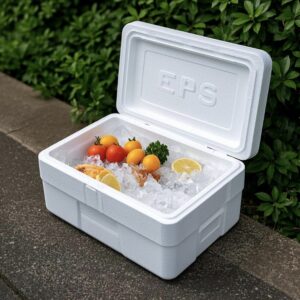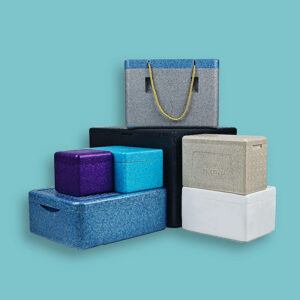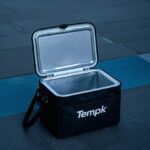Introduction
As living standards improve, people are increasingly focused on enhancing their quality of life. EPS foam insulated boxes, a key tool for temperature control, are gaining widespread attention and popularity.
Whether it’s to preserve the freshness of food or to ensure the efficacy of medicines, foam insulated boxes play a crucial role. They provide a consistent temperature environment for goods and protect them from damage during transport. Thanks to their excellent thermal insulation performance and lightweight, portable design, EPS foam insulated boxes are becoming a standard in cold chain logistics, food delivery, and more.
In addition to commercial uses, foam insulated boxes are also becoming more common in households. Whether it’s for keeping food fresh, for an outdoor picnic, or for preparing warm lunches for children, this versatile product meets people’s demands for quality living.

1. The Science Behind Insulation
Insulation is a process that prevents heat transfer, relying on three basic methods: conduction, convection, and radiation. The design of an insulated box aims to minimize these three types of heat transfer to achieve optimal insulation.
- Conduction: Heat transfer through solid materials. Metals are good conductors, while most non-metals (like plastics and foams) are poor conductors. Insulated boxes use low-conductivity materials as insulation layers to prevent heat from passing through the walls.
- Convection: Heat transfer through fluids (liquids or gases). Inside a sealed insulated box, convection is minimal, so heat transfer mainly occurs through conduction and radiation. However, when the box is opened, external air can cause heat loss.
- Radiation: Heat transfer through electromagnetic waves. All objects emit and absorb some level of thermal radiation. Insulated boxes use low-emissivity materials on the interior walls to reduce radiative heat loss.
2. What is EPS Material?
EPS stands for Expanded Polystyrene, a widely used foam plastic material made from polystyrene resin and a blowing agent. EPS is formed through a foaming process, creating a closed-cell structure.
Features of EPS:
- Lightweight and high strength
- Excellent thermal insulation
- Low water absorption, moisture-resistant
- Chemically stable
- Recyclable
Thanks to its superior insulation properties and environmental benefits, EPS is widely used in building insulation, cold storage boxes, food packaging, and more.
3. How EPS Insulated Boxes Provide Thermal Insulation
The thermal insulation of EPS insulated boxes mainly comes from the excellent insulation properties of EPS foam itself. EPS is composed of many tiny closed cells filled with air, which is an excellent insulator. For heat to pass through EPS foam, it must navigate around these gas-filled cells, significantly lengthening the heat conduction path and reducing thermal conductivity.
Additionally, the foam structure of EPS impedes convection. Convection requires space to form, but the small gaps within EPS prevent this, leaving radiation and minimal solid conduction as the primary modes of heat transfer within the box, resulting in excellent insulation.
The outer shell of EPS insulated boxes is usually made of plastic or metal for mechanical strength and durability, while the interior is lined with reflective films to reduce radiative heat loss and enhance insulation performance.
4. Advantages of EPS Insulated Boxes
Compared to other types of insulated boxes, EPS insulated boxes offer numerous advantages:
- Exceptional Insulation: EPS foam is an excellent insulator with extremely low thermal conductivity, effectively preventing heat loss and providing long-lasting insulation.
- Lightweight: EPS is naturally light, and the simple structure of the boxes further reduces their weight, making them easy to carry and transport.
- Eco-Friendly and Non-Toxic: EPS is non-toxic and environmentally friendly, making it safe for food and pharmaceutical use.
- Durable Structure: Despite being lightweight, EPS foam has high compressive strength, and the outer shell is tough, making the boxes sturdy and durable.
- Affordable: EPS is inexpensive, and the production process is relatively simple, resulting in cost-effective insulated boxes.
- Recyclable: EPS is a recyclable material, contributing to environmental protection and resource conservation.
5. Applications of EPS Insulated Boxes in Fresh Food Logistics
EPS insulated boxes are widely used in the transportation and delivery of fresh food, primarily in the following areas:
- Cold Chain Transportation for Fresh Food: Foods like meat, fruits, vegetables, and dairy products require specific low temperatures for transport. EPS insulated boxes provide the ideal environment to extend the freshness of these products.
- Food Delivery Insulation: With the rise of the food delivery industry, EPS insulated boxes are widely used to maintain the temperature of food, preventing it from spoiling or cooling too quickly during transport.
- Temporary Food Storage: EPS insulated boxes can also be used for temporary cold storage of food, such as keeping food fresh during outdoor picnics.
Advantages in Fresh Food Logistics:
- Excellent insulation to extend food freshness.
- Lightweight for easy transport and handling.
- Durable structure to protect food from damage.
- Eco-friendly and non-toxic, with no contamination risk.
- Cost-effective with high value for money.
6. Applications of EPS Insulated Boxes in Medical Cold Chain Logistics
EPS foam insulated boxes are extensively used in the medical cold chain sector. Here are their main applications and advantages:
- Pharmaceutical Transport Insulation: EPS foam insulated boxes provide the right temperature environment for transporting medicines, vaccines, and other pharmaceutical products, ensuring their effectiveness and safety. EPS foam boxes meet the strict temperature requirements of pharmaceutical products due to their excellent thermal insulation.
- Biological Sample Transport: Biological samples, such as blood and tissue, are extremely temperature-sensitive and must be transported within specific temperature ranges. EPS insulated boxes create the appropriate low-temperature environment, preventing temperature fluctuations from affecting the samples.
- Cold Chain Delivery Applications: As industries like food delivery and cold chain logistics grow, EPS insulated boxes are increasingly used to maintain proper low temperatures for perishable goods, ensuring their freshness and quality.
Advantages in Medical Cold Chain Logistics:
- Outstanding insulation performance.
- Lightweight for easy transport.
- Durable structure with high impact resistance.
- Eco-friendly and non-toxic, with no risk of contaminating medical products.
- Cost-effective with high value for money.
7. How to Choose the Right Foam Insulated Box
When selecting an EPS insulated box, consider the following factors based on your needs:
- Size: Determine the size required for your storage needs. Larger sizes hold more items but are heavier. Choose the smallest size that meets your needs for easy portability.
- Insulation Time: Different uses require different insulation times. Standard models are sufficient for a few hours, but for 12 hours or more, choose a thicker or vacuum-insulated model.
- Material: The outer shell of EPS insulated boxes typically comes in plastic or metal. Plastic is lighter and more economical, while metal is more durable. Choose based on usage intensity.
- Color: The color affects both aesthetics and insulation. Lighter colors reflect more heat, slightly improving insulation performance.
- Additional Features: Some high-end boxes offer features like refrigeration, temperature display, or built-in wheels. Choose according to your needs.
- Budget: Prices vary widely depending on brand and specifications, ranging from a few dollars to several hundred. Select a product with the best value within your budget.
8. Why Choose Huizhou EPS Foam Insulated Boxes?
Shanghai Huizhou Industrial Co., Ltd., with over ten years of experience in cold chain temperature control packaging, is a high-tech enterprise and a long-term partner of many large enterprises in the pharmaceutical, food, and fresh food industries. We have an independent R&D center (1400M²) and laboratory in Shanghai, certified by CNAS and ISO9001. Besides producing and selling a full range of temperature control products, we can customize cold chain temperature control packaging solutions and professional validation services according to your specific needs.
As one of our mature temperature control products, our EPS foam insulated boxes stand out in quality, design, customization options, price, after-sales service, and production capacity.
Feel free to browse our product details and share your specific needs with us, and we will ensure to provide you with satisfactory products and services!

























